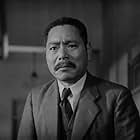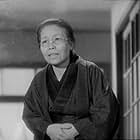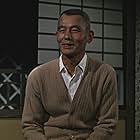Tôkyô no yado
- 1935
- 1h 19m
IMDb RATING
7.4/10
1.7K
YOUR RATING
Unemployed Kihachi and his two sons struggle to make ends meet. But that doesn't keep Kihachi from wooing single mother Otaka.Unemployed Kihachi and his two sons struggle to make ends meet. But that doesn't keep Kihachi from wooing single mother Otaka.Unemployed Kihachi and his two sons struggle to make ends meet. But that doesn't keep Kihachi from wooing single mother Otaka.
- Director
- Writers
- All cast & crew
- Production, box office & more at IMDbPro
Storyline
Did you know
- TriviaThe credits indicate that the script was based on an original work by a foreign writer with a name that sounds like "Winzart Monet", but it is actually a gag name, derived from "without money".
- ConnectionsFeatured in A Story of Children and Film (2013)
Featured review
A classic exercise for one with writers block is to pick a location, then build a story around it. I haven't read anything to suggest Ozu was suffering from writers block at the time, but that is the way much of 'An Inn in Tokyo' plays out, with a good two thirds of the story occurring in the empty fields outside factories. The fields are bare bar for unkempt shin high grass, and old bits of machinery, mostly performing the role of seats, strewn about, with towers and cranes and billowing smoke always looming in the background - a symbol of dirty prosperity amongst the otherwise barren landscape. And who does Ozu put in these fields? Why a father and two sons of course, which will come as no surprise to anyone familiar with his other silent work - it seems to be his special subject. The story plays out like a groundhog day - the man and his sons have no money, and wander the fields from factory to factory looking for work, filling their time between rejections by sitting in the fields and having the same conversations as the previous day - different variations of, 'Are you hungry?" What little money they do have, his sons blow on buying a nice hat they saw another boy with, before losing their fathers rucksack. It all looks nigh on hopeless before a chance encounter with a past friend at an inn in Tokyo finds him some work, and offers a floor to sleep on. They befriend a fellow jobless woman and her daughter, unselfishly sharing food with them, before the story takes a dramatic and heartbreaking (albeit not unpredictable) turn when the daughter gets sick, and the question of all adults are begged - what are you prepared to do for the sake of your children, and what is the cost?
It is a typically humble, family driven film from Ozu, where all characters are flawed, yet viewed with a sympathetic eye for the difficulties they face. Such is the down to Earth quality of the film (even Ozu's camera placements are 'down to Earth') that 'entertainment' hardly feels like an apt description, which is both a gift and a disservice. A gift in that it doesn't feel too showy or trivial, and a disservice in that it is a touch lackluster. Ozu's best silent work ('I Was Born But', 'Passing Fancy') contain similar themes in the same style, yet manage to entertain thanks to humour and charm. Those moments are not totally absent here, just more subdued. While the low key repetitiveness of the first act will threaten to turn some viewers away, it ultimately gives the drama of the final act greater impact, and the film is better for it. It is definitely one for those who like their films depressing, but makes a fine entry in the genre, and is preferable to Ozu's earlier, melodramatic silent 'A Story of Floating Weeds'. 6.5/10
It is a typically humble, family driven film from Ozu, where all characters are flawed, yet viewed with a sympathetic eye for the difficulties they face. Such is the down to Earth quality of the film (even Ozu's camera placements are 'down to Earth') that 'entertainment' hardly feels like an apt description, which is both a gift and a disservice. A gift in that it doesn't feel too showy or trivial, and a disservice in that it is a touch lackluster. Ozu's best silent work ('I Was Born But', 'Passing Fancy') contain similar themes in the same style, yet manage to entertain thanks to humour and charm. Those moments are not totally absent here, just more subdued. While the low key repetitiveness of the first act will threaten to turn some viewers away, it ultimately gives the drama of the final act greater impact, and the film is better for it. It is definitely one for those who like their films depressing, but makes a fine entry in the genre, and is preferable to Ozu's earlier, melodramatic silent 'A Story of Floating Weeds'. 6.5/10
Details
- Release date
- Country of origin
- Language
- Also known as
- An Inn in Tokyo
- Production company
- See more company credits at IMDbPro
- Runtime1 hour 19 minutes
- Color
- Sound mix
- Aspect ratio
- 1.37 : 1
Contribute to this page
Suggest an edit or add missing content

























